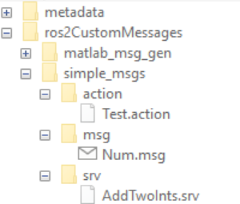ROS 2 Custom Message Support
Custom Message Overview
Custom messages are user-defined messages that you can use to extend the set of message
types currently supported in ROS Toolbox. If you are sending and receiving supported message types, you do not need
to use custom messages. To see a list of supported message types, call ros2 msg
list in the MATLAB® Command Window.
Custom message creation requires ROS 2 packages, which are detailed in the ROS Wiki at ROS 2 Packages. After ensuring that you have valid ROS 2 packages for custom
messages, call ros2genmsg
with the file path to the location containing the custom message package folders to
generate the necessary MATLAB code to use custom messages. For an example on how to generate a ROS 2
custom message in MATLAB, see Create Shareable ROS 2 Custom Message Package.
If this is your first time using ROS 2 custom messages, check ROS Toolbox System Requirements.
Custom Message Contents
ROS 2 custom messages are specified in ROS package folders that contains
msg, srv, and action
directories.
Note
ROS Toolbox supports the existence of multiple custom messages folders on the MATLAB path at any given time. These folders can contain multiple custom message packages.
The msg folder contains all your custom message type
definitions. You should also add all custom service type definitions to the
srv folder and add all custom action type definitions to the
action folder. For example, the package
matlab_msg_gen has this folder and file structure.

The package contains one custom message type in Num.msg and one
custom service type in AddTwoInts.srv, and one custom action type in
Test.action. MATLAB uses these files to generate the necessary files for using the custom
messages contained in the package. For more information on creating
msg and srv files, see Creating ROS 2 msg and srv on ROS 2 documentation.
Note
The custom message libraries generated for ROS 2 are user-created files that integrate into the internal ROS workflow. To safeguard these files from unauthorized access and maintain system integrity, set appropriate directory permissions to restrict access to only intended user accounts.
Custom Message Creation Workflow
Once you have your custom message structure set up as described in the previous
section, you can create the code needed to use these custom messages. First, you call
ros2genmsg
with your known path to the custom message files to create MATLAB code.
The ros2genmsg
function takes your custom message files (.msg,
.srv, and .action) and converts each message
type to working MATLAB code. The ros2genmsg function looks for
.msg files in the msg folder, for
.srv files in the srv folder, and for
.action files in the action folder. This code
is a group of functions that define the message properties when you create new custom
messages. The function then creates the required MATLAB M-files for the different
message functions.
After the ros2genmsg
function creates these files, you must add the function files to the MATLAB path. These steps are given as prompts in the MATLAB Command Window. Use ros2 msg
listros2message
function to verify that the new custom messages are available.
For an example of this procedure, see Create Shareable ROS 2 Custom Message Package. This example uses sample custom message files to create custom messages in MATLAB.
You need to complete this procedure only once for a specific set of custom messages. After that, you can use the new custom messages like any other ROS message in MATLAB and take advantage of the full ROS functionality that ROS Toolbox provides. Repeat this generation procedure when you would like to update or create new message types.
You must maintain the MATLAB path that contain the files directories.
Code Generation with Custom messages
Custom message, service, and action types can be used with ROS 2 Simulink® blocks and MATLAB functions to generate C++ code for a standalone ROS 2 node. The
generated code (.tgz archive) will include the custom message
definitions and the ROS 2 custom message packages. When the generated code is built
in the destination Linux System, the custom message packages are hence automatically
available in the colcon workspace.
If you change the custom message definitions in MATLAB for your application, you must delete the custom message package on the destination Linux System, regenerate the C++ code, and redeploy it.
Replacing Definitions of Built-In Messages With Custom Definitions
MATLAB provides a lot of built-in ROS 2 message types. You can replace the
definitions of those message types with new definitions using the same custom
message creation workflow detailed above. When you are replacing the definitions of
a built-in message package, you must ensure that the custom message package folder
contains new definitions (.msg files) for all the message types
in the corresponding built-in message package.